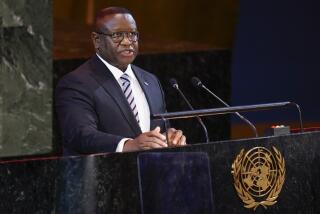Algeria Soldier Killed in 1st Violence Since Fundamentalist Vote Victory Was Stalled
- Share via
ALGIERS — In the first outbreaks of violence since the military derailed a Muslim fundamentalist victory at the polls last week, a soldier was killed and two others wounded in an attack on a police checkpoint south of the Algerian capital, authorities reported Sunday.
In a separate incident, a homemade bomb was hurled Saturday night at the national militia headquarters in Algiers, and fundamentalist leaders warned that it may be difficult to contain further explosions of violence.
The Islamic Salvation Front, which was ready to claim a majority of the seats in the National Assembly before the army forced President Chadli Bendjedid to resign and canceled the balloting, predicted Sunday that “heavy consequences” would result from “provocations . . . aimed at creating an explosive situation.”
Authorities have reportedly arrested more than 500 Islamic Front supporters since the crackdown Jan. 12, and the country has been left perilously adrift as the fundamentalists and the authorities maneuver for position.
An Arab military source said that army leaders have targeted the middle-level Islamic Front leadership for arrests, seeking to cut off the lines of communication between the rank-and-file and acting front leader Abdelkadir Hachani.
“But Hachani will be arrested also, there is no doubt, it is only a question of when,” said the official, who asked not to be identified.
The same official said Bendjedid is being held under virtual house arrest at a family residence in Zeralda, about 18 miles west of Algiers, where he has been visiting with relatives since his resignation announcement last weekend. The house is surrounded by a tank brigade, the official said.
During weekly prayers on Friday, when riot police and soldiers surrounded the city’s mosques, Islamic Front leaders appealed to thousands of supporters for calm, seeking to check any confrontation that would give the government an excuse to step in and outlaw the Islamic party.
But Hachani vowed that the fundamentalists would eventually prevail, despite the crackdown. “The FIS (Islamic Front) will arrive in power, because the present power is already in view of what’s ahead: its own disappearance,” he told followers. “The FIS has provoked the resignation of a government, including the president of the republic and will provoke that of the regime as well.”
Meeting for the first time since the first round of elections in late December, 188 Islamic Front candidates who had been assured of seats in the 430-seat National Assembly after the first round of balloting demanded the election of a new Assembly, with its head to take over as president. Bendjedid dissolved the present Parliament at the time of his resignation.
Currently in place at the head of government is a five-member Higher Council of State headed by former revolutionary war hero Mohammed Boudiaf, which purports to represent all factions of the Algerian community, including the defense, religious and human rights establishments.
In fact, Defense Minister Khaled Nezzar is thought to be the real strongman behind the present regime. Prime Minister Sid Ahmed Ghozali, who is said to have sided with the army against Bendjedid in the days before the coup, has remained in charge of the government ministries and has close ties to all the members of the higher council.
All three parties that won seats in the Dec. 27 balloting--the Islamic Front, the National Liberation Front, which singlehandedly governed Algeria for more than 30 years after independence, and the smaller Socialist Forces Front--have condemned the new governing council as unconstitutional.
In one of his first steps as acting head of state, Boudiaf has appointed a committee to begin revising Algeria’s electoral law, a move that could ultimately lead to the dissolution of the Islamic Front on legal grounds.
“No one has the right, individually or as a group, to monopolize religion or to exploit it toward suspect ends,” he warned after returning to Algeria last week after 28 years in exile in Morocco.
Police provided few details of the two incidents, which marked the first outbreaks of violence since the army clampdown.
They said “armed elements” attacked a police post Saturday night near Sidi Moussa, about 11 miles south of Algiers, with automatic weapons and small homemade bombs. One soldier was killed and two police officers were wounded, authorities said.
There were no injuries when, the same night, a bomb was thrown at national police headquarters in Algiers.
More to Read
Sign up for Essential California
The most important California stories and recommendations in your inbox every morning.
You may occasionally receive promotional content from the Los Angeles Times.










